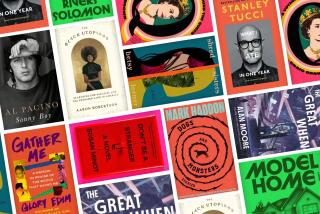What makes a novel a Hollywood novel?
The media and the marketers who play to them probably share some blame for branding nearly any book set in Los Angeles as a Hollywood novel. In June, Time magazine lumped together Robert Cortâs âAction!â (Random House) and Gigi Levangie Grazerâs âManeaterâ (Simon & Schuster). They make an odd couple. Producer Cortâs novel is an old-fashioned family saga packed with detail about the business. Grazerâs comedy of manners about life on the Westside is extremely short on Hollywood dish, considering that sheâs a screenwriter and that her husband is the Oscar-winning producer Brian Grazer. The book gets as personal as a pelvic exam with the women who shop, eat and sleep on the fringes of the industry and the men who buy them salad. But they could as easily be devouring guys in Scarsdale as in Beverly Hills.
Screenwriter and director Bruce Wagner sees the dark side of slapping the Hollywood label on novels, including his own. âI donât object to it,â he says, âbut itâs a way of almost minimizing an authorâs attempt to transcend certain themes that are obvious -- the idea of fame, of riches and celebrity. These are tabloidal, in a sense, and yet if written about outside of Hollywood, theyâre given more consideration.â
For the record:
12:00 a.m. Sept. 6, 2003 For The Record
Los Angeles Times Saturday September 06, 2003 Home Edition Main News Part A Page 2 National Desk 0 inches; 26 words Type of Material: Correction
Actorâs name -- An article in the Aug. 31 Calendar about what makes a Hollywood novel misspelled the last name of actor Joseph Cotten as Cotton.
Wagner has been writing satiric novels set in Hollywood since 1991âs âForce Majeureâ; his fourth, âStill Holding,â will be published in November by Simon & Schuster. He doesnât think novelists who work in and write about the business are guilty of navel-gazing. â âWrite what you knowâ is one of those tropes thatâs actually meaningless,â he says. âI write about despair, love. I try to write about those things. I donât claim to know about them. As a writer, I write what Iâm compelled to write about from a deep place, not from having been mistreated recently in a pitch meeting. What you strive for as a writer is to move people, not to bring down Jerry Bruckheimer.â
Itâs easier to use real names in a novel than in a memoir, although memoirist beware, or youâll never eat lunch in this town again. Producer Lynda Obst, who wrote âHello, He Lied: And Other Truths From the Hollywood Trenches,â says that every time sheâs sat down to write fiction about the business she knows, she quits after 12 pages because âit just feels so cheesy. You canât make stuff up about Hollywood and have it be more interesting than what goes on. Iâm dazzled by the surreality of the place -- its lack of subtlety, its baldness and venality. Most of the people writing fiction tend to thinly disguise what they know myopically. You tend to have these books about little baby power struggles, and theyâre as boring as a bad dinner party here.â
In a review in July in the New York Times, Leslie Epsteinâs âSan Remo Driveâ (Handsel Books) was praised as âone of the four best Hollywood novels ever written.â (Epsteinâs âPandaemonium,â Budd Schulbergâs âWhat Makes Sammy Run?â and F. Scott Fitzgeraldâs âThe Last Tycoonâ completed the list.) The authorâs father and uncle were the screenwriters Philip G. and Julius J. Epstein, best known for âCasablanca,â and his fictionalized memoir depicts growing up in the â40s and â50s among people in the business. But Hollywood only creeps into the storyâs peripheral vision.
â âSan Remo Driveâ is more of a family novel,â Epstein says. âBut itâs also true that it wouldnât be the same book if the boys werenât trick-or-treating at Gregory Peck or Joseph Cottonâs. Thereâs an intersection of the great popular mythmaking and oneâs private family myths. If the story were set anywhere else, it wouldnât have that kind of resonance. Itâs not about filmmaking in the way that a lot of other books are, but it is a Hollywood novel because of the way in which my psyche was invaded by popular culture.â
Take Epsteinâs idea to its logical conclusion, and perhaps a lot of novels are Hollywood novels, to the extent that Hollywood is the repository of our collective memories and dreams. Epstein says: âHow did I learn about what motherhood is supposed to be, except by watching Dumboâs mother? How do we know what love is? My ideas about love were largely formed not by reality but by Hollywoodâs impression of reality. If Iâd grown up in Des Moines, the family wouldnât have been different, but the resonance would have.â
-- Mimi Avins
More to Read
Sign up for our Book Club newsletter
Get the latest news, events and more from the Los Angeles Times Book Club, and help us get L.A. reading and talking.
You may occasionally receive promotional content from the Los Angeles Times.






